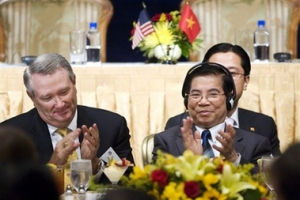WASHINGTON - Vietnam's president may face an uncomfortable reception with U.S. lawmakers keen to discuss claims of widespread human rights abuse in his country as well as its spectacular economic success.
Nguyen Minh Triet was to visit Washington on Thursday, the first such trip by a president of the communist-led country since the Vietnam War, with a delegation of more than 100 Vietnamese businessmen. The group planned to play up negotiations to buy jets from Boeing Co. and a possible Trade and Investment Framework Agreement, which sometimes acts as a road map to eventual free trade negotiations.
Triet also must navigate potential political hazards in the U.S. Congress, where lawmakers have criticized Vietnam for ignoring human rights pledges and increasing its repression of dissidents.
"I'll let him know that if we're going to bolster our friendship with Vietnam, as he wishes, Vietnam must embrace political pluralism in all of its forms," said Republican Rep. Ed Royce, who plans to attend the Thursday meeting hosted by House Speaker Nancy Pelosi. "Silencing dissidents and suppressing religious freedoms are not the ways toward a close partnership."
Triet was to meet Friday with President Bush at the White House.
Vietnam, which has one of Asia's fastest growing economies, achieved its goal of membership in the World Trade Organization in January; U.S. officials expressed hope at the time that the country had begun making progress toward turning around a dismal rights record.
Rights group say, however, that Vietnam has embarked on one of the worst crackdowns on dissidents in years. Vietnam has arrested or sentenced at least eight pro-democracy activists in recent months, including a dissident Catholic priest who was sentenced to eight years in prison.
In a message of disapproval to Vietnam, Bush met in May with four Vietnamese-American activists.
One of the activists, Diem Do, chairman of the Vietnam Reform Party, met with Pelosi on Wednesday. He urged her to press Triet to release political prisoners and respect the rights of Vietnamese citizens.
Pressure by lawmakers and by Bush, he said, could result in progress in Vietnam. "Vietnam needs the U.S. for economic development; it needs the U.S. to integrate into the international community," he said. "The U.S. is in a great position to exert pressure for human rights and democracy in Vietnam."
Vietnam does not tolerate any challenge to Communist one-party rule; it insists, however, that only lawbreakers are jailed. In an attempt to ease misgivings in Washington, Vietnam released two political dissidents recently.
Frederick Brown, a Southeast Asia specialist at Johns Hopkins University's School of Advanced International Studies, said Triet will be prepared for strong words from some in Congress.
"He will get an earful on Capitol Hill with regard to human rights," Brown said. But, he said, "there's no denying the really immense gains that have been made in the relationship because of two-way trade."
Since the two countries began a bilateral trade agreement in 2001, trade has been booming. It reached nearly $10 billion last year. Vietnam's WTO entry is expected to lead to further U.S. investment.

















